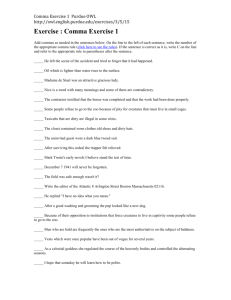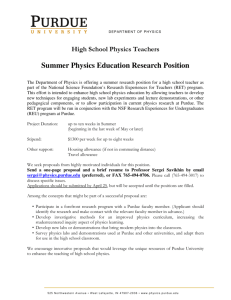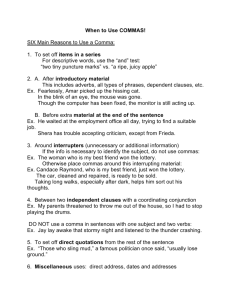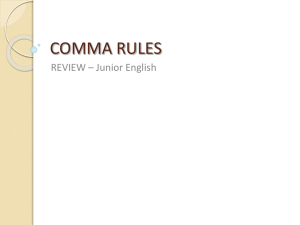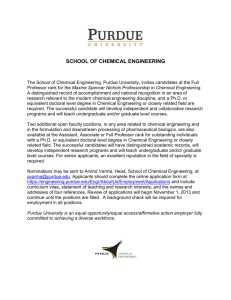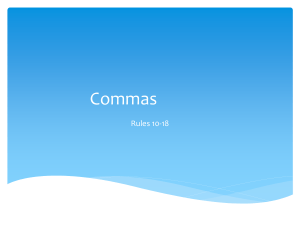Comma Usage
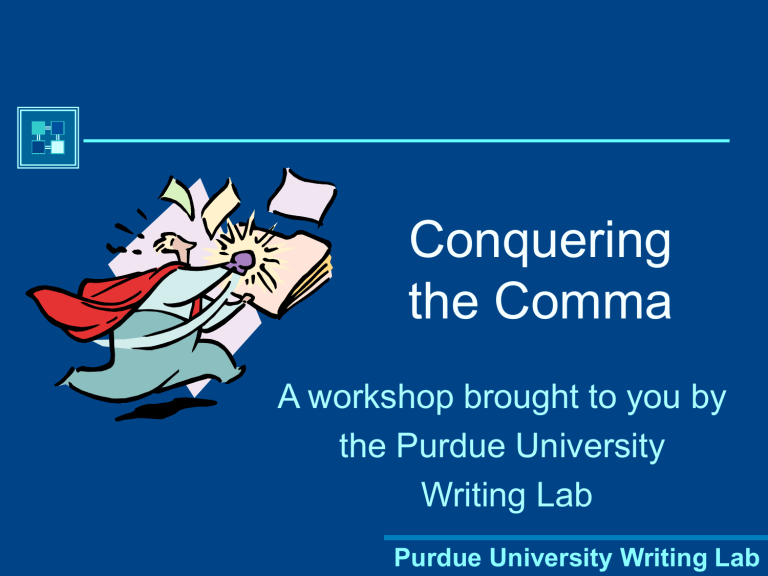
Conquering the Comma
A workshop brought to you by the Purdue University
Writing Lab
Purdue University Writing Lab
What Is a Comma?
A comma is a punctuation mark that indicates a pause is needed in a sentence.
Commas help to clarify meaning for the reader.
Purdue University Writing Lab
Clauses and Phrases
A clause is a group of words that contains both a subject and a verb that complement each other.
A phrase is a group of words that does not contain a subject or a verb that complement each other.
Purdue University Writing Lab
Sentence Structure:
Independent Clause
A complete sentence has two components, a subject and a verb.
The subject and verb must form a complete thought to be considered an independent clause.
The couple dances.
.
subject (S) verb (V)
Purdue University Writing Lab
Sentence Structure:
Compound Sentence
A sentence that contains two independent clauses joined by a coordinating conjunction is called a compound sentence.
Conjunctions
for
and
nor
but
or
A conjunction joins words, phrases, and clauses together in a sentence.
yet
so
FAN BOYS
Purdue University Writing Lab
Sentence Structure:
Compound Sentence
The comma in a compound sentence is placed before the coordinating conjunction.
S V conj.
Andy built a snowman, and
Andy built a snowman , and
Jeff played with his dog.
Jeff played with his dog.
S V
Purdue University Writing Lab
Sentence Structure:
Compound Sentence
Where would you place the comma in the following sentence?
Dan struggled with his homework so his father helped him.
S V conj.
S V
Purdue University Writing Lab
Sentence Structure:
Dependent Clause
A dependent clause Some dependent clause markers: contains a subject and verb, but the clause cannot stand independently.
because since when while though although unless after
Dependent clauses can often be identified by the use of dependent clause markers.
until if as before once whether
Purdue University Writing Lab
Sentence Structure:
Dependent Phrases and Clauses
Dependent phrases and clauses help to clarify and add detail to an independent clause.
Dependent clauses may appear at the beginning, middle, or end of a sentence.
Purdue University Writing Lab
Introductory clause= dependent clause located at the beginning of a sentence
When a dependent clause is placed at the beginning of a sentence, place a comma between the independent clause and the dependent clause.
DCM S V S V
Purdue University Writing Lab
Introductory Clause
DCM
Where would you place the comma in the following examples?
DCM S V
, we decided to go to the movies.
S V
,
I fell asleep.
S V S V
DCM S
, we went out for coffee.
V S V
Purdue University Writing Lab
Dependent Clauses
When a dependent clause is located after an independent clause,
DO NOT place a comma between the two.
I went on the roller coaster because my brother dared me.
S V DCM S V
I became very sick when the
S V DCM roller coaster zoomed upside down.
S V
Purdue University Writing Lab
Sentence Structure:
Essential Phrases and Clauses
An essential clause or phrase is used to modify a noun.
It also adds information that is critical to the meaning of the sentence.
Essential clauses are NOT set off by commas.
Purdue University Writing Lab
Sentence Structure:
Essential Phrases and Clauses
The people who work in my office are so uptight!
S essential phrase V
Without the essential phrase, this sentence does not make complete sense : The people are so uptight!
Purdue University Writing Lab
Sentence Structure:
Essential Phrases and Clauses
The martini that I had at Joe’s was much better than this one!
S essential V
The word “that” is almost always an indicator of an essential phrase or clause.
Purdue University Writing Lab
Sentence Structure: Nonessential
Phrases and Clauses
A nonessential phrase or clause adds extra information to a sentence.
This information can be eliminated from the sentence without jeopardizing the meaning of the sentence.
Always place commas around nonessential phrases and clauses.
Purdue University Writing Lab
Sentence Structure: Nonessential
Phrases and Clauses
My brother , who lives across town , plans to throw a party!
S non-essential V
Even without the phrase the sentence still makes sense : My brother plans to throw a party!
Purdue University Writing Lab
Sentence Structure: Nonessential
Phrases and Clauses
S V
Steve said that he would propose to me on
Valentine’s Day, which is my favorite holiday !
non-essential
Use commas to set off additional information
Purdue University Writing Lab
Would you place commas in the following sentences? If so, where?
,
The place that I would most like to see is the Eiffel Tower.
No comma is needed. The sentence is correct.
, who is one of my
, will meet
Purdue University Writing Lab
Sentence Structure:
Commas in a Series
Place commas in a sentence to divide items in a list.
The commas will help the reader to avoid confusion.
The comma before the conjunction is generally required, but it can be omitted if there is no possibility of confusion.
Purdue University Writing Lab
Sentence Structure:
Commas in a Series
Consider the difference in the following:
Last month, Alex dated Mary Ann Lee and Kim.
Last month, Alex dated Mary, Ann, Lee, and Kim.
Last month, Alex dated Mary Ann, Lee, and Kim.
How many women did Alex date?
Purdue University Writing Lab
Sentence Structure:
Commas in a Series
Commas should be placed in series of words, phrases, or clauses.
Place commas in the following sentences:
, put on
, and went to bed.
, she kissed a frog , and she
Purdue University Writing Lab
Commas with adjectives
Use commas to separate adjectives that provide an equal description of a noun.
THE TEST:
Can you put “and” between the adjectives?
Can they be described in reverse order?
If so, use a comma.
big blue house three hungry kittens a cranky, ungrateful man
Purdue University Writing Lab
A Common Comma Error:
The Comma Splice
A comma splice is an error in which two independent clauses are joined by a comma.
We had a nice time , I hope we can meet again soon.
S V S V
The Internet has revolutionized the business world ,
S V online sales have increased dramatically this year.
S V
Purdue University Writing Lab
To Correct a Comma Splice
Insert a conjunction between the two independent clauses.
Start a new sentence.
Insert a semi-colon between the two independent clauses (only in cases where the independent clauses are closely related in topic).
• We had a nice time, and I hope we can meet again soon.
• We had a nice time. I hope we can meet again soon.
• The Internet has revolutionized the business world; online sales have increased dramatically this year.
Purdue University Writing Lab
How would you correct the following sentences?
Purdue University Writing Lab
Where can you go for additional help with comma usage?
Purdue University Writing
Lab
Heavilon 226
Grammar Hotline:
(765) 494-3723
Check our web site: http://owl.english.purdue.edu
Email brief questions: owl@owl.english.purdue.edu

